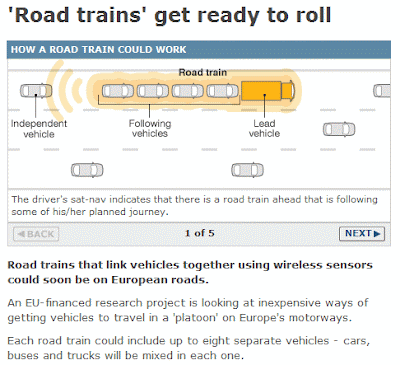Here's a selection of recent articles on this topic:
With this story, you should think about the problems that the French carbon tax has caused, and consider whether you favour a tax or a free market trading scheme in order to try and control carbon emissions.
The 'road train' is an example of what we are all hoping: for scientific research to come up with to solutions to remove environmental problems while allowing us to continue to lead consumerist lifestyles. The unanswered question is whether new technology will appear fast enough to avoid environmental disaster.
As economists we should think about what kind of system is most likely to produce technological advances. Will a free market system of fear of competition and hope for profit stimulate businesses to continually look for innovation? Or would a system where government spends a considerable amount of tax revenue on R + D, and places rules on how much firms have to spend on it, be more successful? Or is it foolish to put so much of our hope into technology rescuing us?
The writer of this article in the Telegraph certainly seems to have more belief in free markets leading to environmental solutions than agreements between governments - not surprising given the recent events in Copenhagen!
Finally, this press release from the UK government is an example of one of the many government policies based on improving information about environmental issues for households.
This is the economic argument: that many of us continue to act in ways which create costs (both for us and the rest of society) because we do not have full information about the consequences of our actions. In this example, government wants every house to have a meter which shows them exactly how much electricity they are using. The hope is that consumers will reduce their use of electricity, saving themselves money and helping the country cut down on energy use and CO 2 emissions.
Which of these approaches to environmental problems do you think will be the most effective?




No comments:
Post a Comment